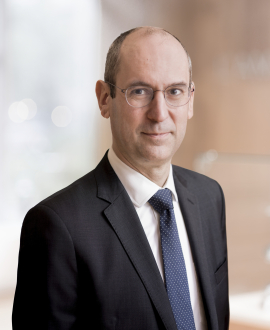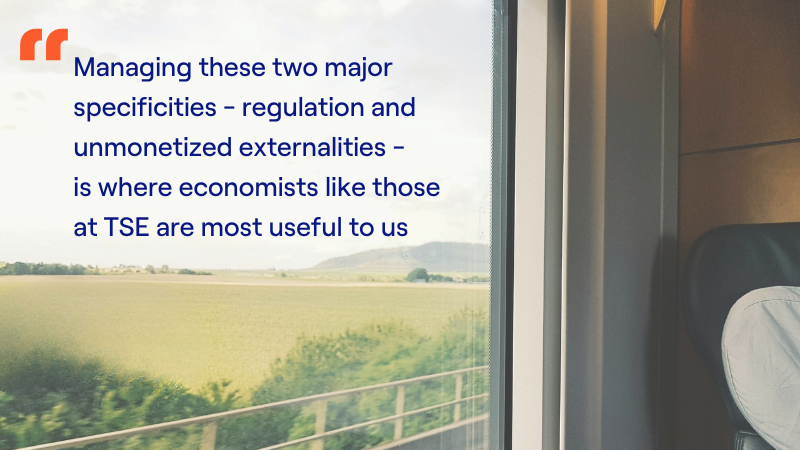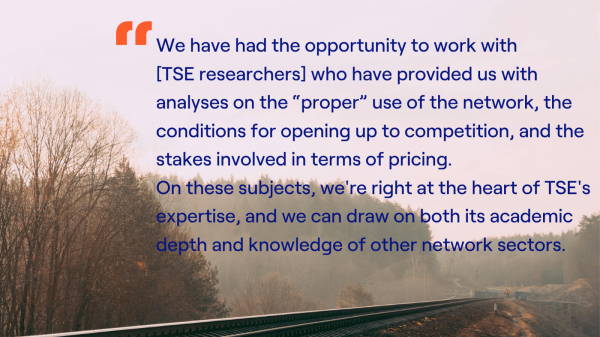 Matthieu Chabanel
Matthieu Chabanel
Chairman and Chief Executive Officer
SNCF Réseau
SNCF Réseau is responsible for France’s rail infrastructure, ensuring the smooth circulation of passenger and freight trains while maintaining and expanding Europe’s second largest national network. A subsidiary of the SNCF Group—a global leader in high-speed rail, freight logistics, and mass transit—SNCF Réseau is at the heart of efforts to modernize rail transport. By supporting TSE research, particularly within the TSE Infrastructure & Network Center, the company helps to advance understanding of topics such as infrastructure pricing, climate adaptation, and the broader social value of rail. In this interview, CEO Matthieu Chabanel shares his views on the sector’s key challenges.
With your background as an engineer and your extensive experience in the public transport sector, how do you currently assess the role that economists can play with decision-makers, particularly in companies and public institutions?
My “encounter” with economics dates back to my training at the École Polytechnique, but above all at the Ecole des Ponts. Nicolas Curien, Pierre-Alain Muet, Gabriel Dupuy and Jean-Charles Hourcade helped me to grasp the fundamentals and forge a firm conviction that economics has a crucial role in informing choices and defining strategy, especially in the field of networks, for policymakers or companies like SNCF Réseau.
The rail network shares many characteristics with other network businesses such as energy, postal services, and water distribution. It is a highly capital-intensive activity—a natural monopoly—that generates regular revenues and is generally resilient to economic fluctuations.
 However, rail transport also has its own economic specificities. The sector is both subsidized and regulated but the lack of any explicit reference in the European framework to full-cost coverage raises very specific governance and financing issues. The balance of the company's cash flows is based on an insufficiently coordinated “three-way game” between the company, the State and the competition authority (Autorité de la Régulation du Transport – ART).
However, rail transport also has its own economic specificities. The sector is both subsidized and regulated but the lack of any explicit reference in the European framework to full-cost coverage raises very specific governance and financing issues. The balance of the company's cash flows is based on an insufficiently coordinated “three-way game” between the company, the State and the competition authority (Autorité de la Régulation du Transport – ART).
Rail transport generates strong positive externalities. Its low consumption of energy and space, and low carbon emissions, make it a valuable ally in the fight against climate change. Improving rail services also boosts the real-estate value of local neighborhoods, creating positive dynamic and agglomeration effects. These externalities are difficult to monetize in ticket prices as competition with cars, aircraft and other forms of transport limits the willingness of passengers and carriers to pay a premium for rail services.
Managing these two major specificities - regulation and unmonetized externalities - is where economists like those at TSE are most useful to us.
In a context marked by the opening up of the European rail market to competition and by the urgency of environmental issues, what are the main challenges you are facing at SNCF Réseau?
The first challenge is to guarantee the quality and modernization of our rail system, which is essential if we are to offer all rail operators a high-quality network. There is an urgent need to renovate France's conventional rail network—which carries 90% of all traffic—notably the TER, Intercités and TGV lines. Without investment, these aging infrastructures risk falling into rapid deterioration like those in Germany, with a profound impact on service quality. The government's conference on financing mobility will recognize the need to prevent this and identify sustainable financing solutions.
Are any of these topics of interest to SNCF Réseau's counterparts in the European Association of Railway Infrastructure Managers?
SNCF Réseau is fully involved in discussing common concerns within PRIME, an exchange platform which brings together all European rail network operators and the European Commission. Within this framework, we carry out benchmarks on the performance of infrastructure managers. We are also working on interoperability investments and harmonizing processes, particularly those concerning capacity allocation. Here, too, economics has an important role in establishing efficient allocation rules.
We also engage in bilateral dialogues with some counterparts, deepening our understanding of the challenges we all face and implementing best practices, including the deployment of new technologies and adapting to climate change.
How has collaboration between SNCF Réseau and TSE evolved over the years?
The partnership between SNCF Réseau and TSE was renewed in 2024. In the beginning, its focus was on the dynamics of opening up to competition. Today, mitigating and adapting to climate challenges has become a new research focus. 
Collaboration with TSE researchers is important for SNCF Réseau to better understand our economic and regulatory environment, to apprehend the interplay of stakeholders and to anticipate the interactions between market opening and pricing. In this field, we have had the opportunity to work with Frédéric Cherbonnier, Marc Ivaldi, Catherine Muller-Vibes and Karine Van Der Straeten, who have provided us with analyses on the “proper” use of the network, the conditions for opening up to competition, and the stakes involved in terms of pricing. On these subjects, we're right at the heart of TSE's expertise, and we can draw on both its academic depth and knowledge of other network sectors.
Our partnership with TSE has resulted in several noteworthy scientific contributions. These include recent work on the effects of carbon pricing on the mobility market. This research can help to support the modal shift that will be essential to achieve our ambitious decarbonization goals. It also emphasizes the importance of considering the cost of mobility for users, as well as the acceptability of carbon pricing.
Interview published in TSE Reflect, July 2025
About SNCF Réseau - TSE Partnership
Photo © SNCF, Pexels
